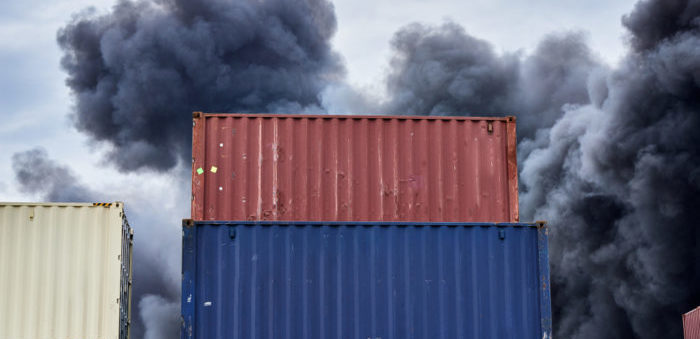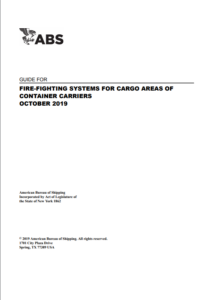ABS launched the “Guide for Fire-Fighting Systems for Cargo Areas of Container Carriers”, presenting a number of notations with guidelines, addressing firefighting and safety systems of cargo holds of container vessels, the location of a series of high-profile fires onboard.
Accordingly, the ABS requirements focus on fire safety in four key areas:
- fire-fighting for containers stowed on deck
- fire-fighting for containers stowed below
- fire safety of the deckhouse
- container hold flooding as a measure for fire-fighting.
#1 FOC-R Notation
The FOC-R notation focuses on container deck firefighting capability onboard Container Carriers when full compliance with the FOC notation requirements is not practical.
It applies to container carriers constructed prior January 1, 2016 designed to carry any number of container tiers on deck or those constructed after 1 January 2016 designed to carry 4 or less tiers of containers on deck, but do provide on deck firefighting arrangements that exceed the SOLAS requirements applicable to those vessels.
The system will be able to provide the quantity of water necessary to simultaneously supply all required mobile water monitors at the most hydraulically remote location at the required flow rate and with the pressure necessary to reach the top tier of the containers on deck along with all other fire-fighting systems and equipment identified above in 3/3.3 at their required flow rates and pressures while maintaining the following minimum pressures at all hydrants on the vessel.
Also, vessels having containers on weather deck will be also equipped with one water mist lance, to be of a type capable of penetrating a standard container. If one water mist lance is provided as per 5C-5-7/3.5.1 of the Marine Vessel Rules, no additional lance is required.
#2 CCH Notation
The notation is about the containers equipped with specific cooling arrangements air monitoring, and other arrangements intended to protect crew within the accommodations, service spaces, machinery spaces and other normally manned locations from the heat as well as smoke that may be created during a cargo fire.
All enclosed spaces on the vessel that would be expected to be occupied or that contain equipment considered to be essential during a fire in a container bay are to be provided with the arrangements identified below. These spaces include but are not limited to the bridge, control stations, machinery spaces and the dedicated assembly space:
- Ventilation Systems
- Air Monitoring
- Dedicated Assembly Space
- Water Spray System
- Protection for Spaces and Equipment Adjacent to Container Holds
#3 FBC Notation
The FBC (Fire-protection Below-deck Container) notation recognizes the installation of fire protection arrangements and capabilities within the container holds of Container Carriers beyond those required by SOLAS.
The notation includes specific features for the optional notation FBC and is intended to reduce the consequences should a fire occur in the container hold of a Container Carrier through the installation of additional detection, extinguishment and cooling measures. In essence:
- Dedicated Cargo Fire Control Station
- Closure Arrangements of Container Hold Openings
- Fire Detection Arrangements
- Smoke and Heat Detection and Monitoring System
- Below Deck Container Hold Water Spray System
- Fire-fighter’s Outfits & 21 Storage of Fire-fighter’s Outfits
- Air Compressors for Breathing Apparatus
#4 CHF Notation
The CHF notation is about Container Carriers that are provided with specific arrangements to flood individual container holds for the purpose of extinguishing a fire in a container hold and for the dewatering thereafter.
The arrangements and procedures are to permit only one single container hold to be flooded at any time. Multiple holds are not to be flooded and the same is to be clearly posted at any controls associated with the arrangements.
In addition, a fixed piping arrangement to dewater each of the container holds is to be provided.
To explore more on the notations, you may click on the PDF herebelow


































































